Baby’s Safe Sleep
Sleep is an important part of a child’s development and physical health. Creating a safe sleep environment will help your baby sleep safely and reduce the risk of sleep-related death.
The safest place for your baby to sleep is in a Health Canada approved crib, cradle, or bassinet. If this is not available there are alternate spaces that can be made into a safe sleep surface. With a light, folded blanket or a small mattress, a baby can safely sleep in a basket, drawer, or box. These items should be firm, flat, and placed securely on the floor in a safe place.
Parents and caregivers can protect babies by following these safe sleep guidelines:
- Always place babies on their back to sleep.
- Babies should be dressed in light sleeper or sleep sack.
- Babies should sleep alone on a firm crib mattress, next to caregiver’s bed for at least the first six months.
- Breastfeeding for at least the first two months can reduce the risk of infant sleep related deaths by half.
- Ensure babies’ environment is smoke and substance free.
- If you plan on sharing a bed with your baby, please consider the questions and the information below to make bed sharing a safe experience.
You are not alone when it comes to taking care of your baby. If you want, or need help please contact your local health care provider.
Baby’s Safe Sleep Environment poster/info sheet.
Safe Bed-sharing
Some people bed-share for personal or cultural reasons. If you decide to bed-share, please consider the following questions:
1. Is your baby healthy and full term (37-40 weeks gestation) at birth? Did your baby weigh more than 2.5kg (5.5lbs) at birth?
2. Were you and your partner tobacco free including smoke and cannabis while pregnant?
3. Is your baby’s environment smoke free?
4. Are you and your partner alcohol and drug free and free of any substance that may make you fall into a deeper sleep?
If NO is answered to any of these questions, then bed-sharing is not recommended.
If you have answered YES to all of these questions, review the following checklist to help create a safer sleeping environment for your baby.
1. Mattress is firm and on the floor.
2. Ensure there is sufficient space around the mattress so the baby cannot become trapped between the bed and a wall/table.
3. Baby is away from any blankets or pillows and there are no toys, or stuffed animals in bed.
4. Baby is sleeping on their back.
5. Baby is on the outside of the bed, not between the caregivers.
6. Other children or pets are not in the bed with the baby.
Newborn Wellness Kits
Expectant parents or caregivers will receive a Newborn Wellness Kit during prenatal or well-child appointment at your local health centre or public health unit. The Newborn Wellness Kit is an educational and health promotion tool that contains quality and safe items and resources, carefully selected in preparation for a child and to support a growing family.
Click here for more information on how to register for a Newborn Wellness Kit.
Inunnguiniq Parenting program
Inunnguiniq is raising a child to become a capable human being.
Led by the Qaujigiartiit Health Research Centre (QHRC), the Inunnguiniq Parenting Program is based on Inuit Qaujimajatuqangit (IQ). The program was made in Nunavut, by Nunavummiut, for Nunavummiut, and rooted in the childbearing advice of an Elders Advisory Committee. The program was built on the “strengths of our communities, our relationships, resilience and love for our children.” It also creates space to discuss healing from trauma; emphasizes Inuit knowledge, stories and perspectives about childrearing; and the role of extended family and community in raising children.
Becoming an Inunnguiniq Facilitator
If you are interested in becoming an Inunnguiniq Facilitator, training is delivered by QHRC in both English and Inukitut throughout the year. Learn more about the Qaujigiartiit Health Research Centre's Inunnguiniq Parenting Program.
Newborn Nutrition
For information on what to feed yourself and your baby, go to Nutrition for pregnant Women and Babies.



